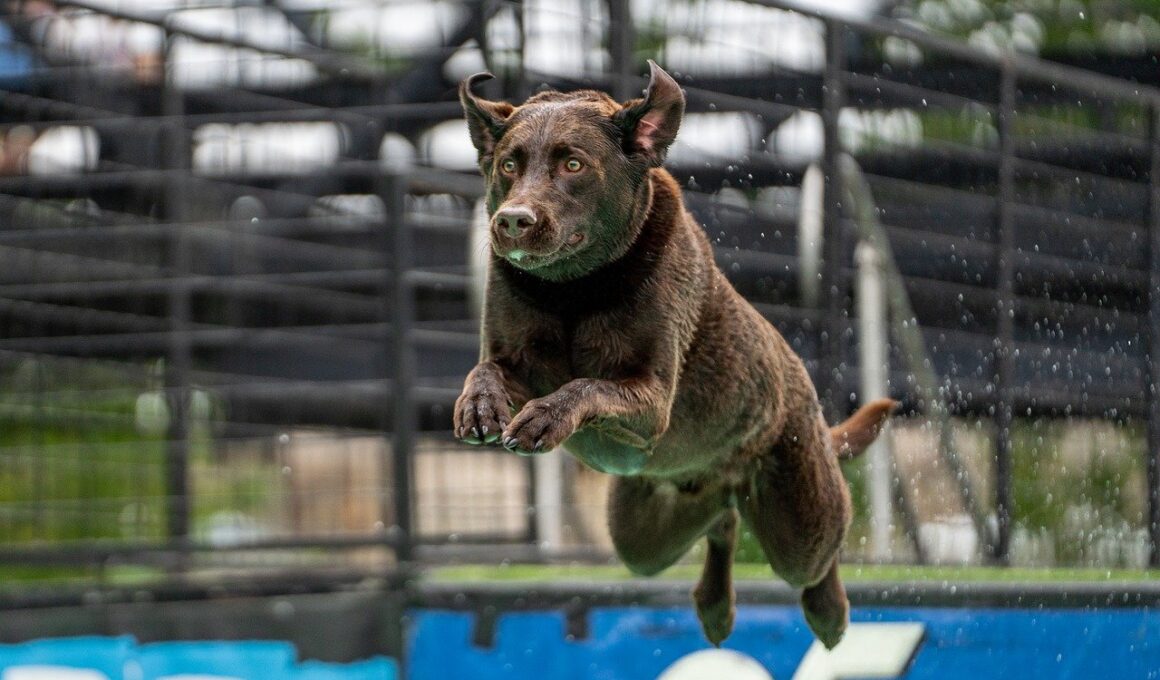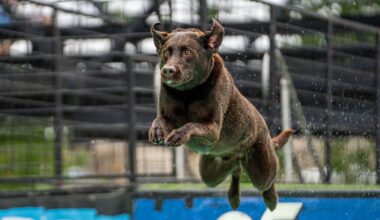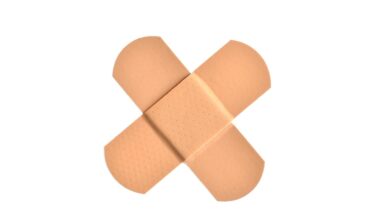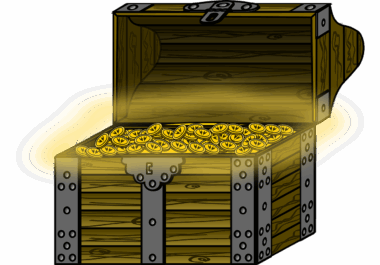Nutritional Needs of Active Dogs
Active dogs, especially those engaged in treasure hunting, have unique nutritional requirements that need careful consideration. These requirements are crucial to ensuring your dog performs optimally during activities. A well-balanced diet provides the necessary energy essential for stamina, focus, and overall health. It’s vital to include high-quality proteins that support muscle recovery and growth. Proteins should usually come from meat, fish, and eggs, as these sources are rich in essential amino acids. Furthermore, carbohydrates play an important role in providing the energy needed for high-energy activities. Whole grains like brown rice and oats, combined with vegetables, can offer the required carbs and fiber. Additionally, healthy fats are essential for maintaining skin health and providing energy for prolonged activities. Sources of fatty acids include fish oil and flaxseed. Finally, hydration is vital, and fresh water should always be accessible to ensure your dog remains well-hydrated. By understanding and meeting these nutritional needs, you can help your active dog excel in treasure hunting activities and maintain their overall well-being.
Just like humans, dogs require specific vitamins and minerals to maintain their overall health, especially when engaging in physically demanding tasks. Vitamins such as A, B, C, D, E, and K have unique roles in bodily functions. Vitamin A is critical for maintaining optimal vision and skin health. B vitamins, particularly B6 and B12, play essential roles in energy metabolism and proper nervous system function. Vitamin C has antioxidant properties, supporting immune health, while Vitamin D aids in calcium absorption, promoting bone strength. Furthermore, Vitamin E is vital for healthy cells, combating oxidative stress. Additionally, minerals like calcium and phosphorus are crucial for bone development, especially in active dogs. Zinc supports a healthy immune system; it also contributes to skin health. Overlooking the significance of these micronutrients can lead to deficiencies that might hamper your dog’s performance. Therefore, it’s prudent to incorporate a variety of foods into your dog’s diet to ensure they receive a broad spectrum of vitamins and minerals. Consulting a veterinarian can also offer guidance on any specific nutritional supplements your dog might need.
Choosing the Right Dog Food
Selecting the appropriate dog food for active dogs engaged in treasure hunting is paramount for enhancing overall performance. A good dog food should be formulated specifically for active, working, or sporting breeds. The first ingredient should ideally be a protein source, such as chicken, beef, or lamb, indicating the food is substantial in high-quality protein. Whole grains or vegetables should be present; examples include sweet potatoes or brown rice, which provide beneficial complex carbohydrates for energy. Ingredients should be devoid of fillers like corn and artificial preservatives, which can adversely affect your dog’s health. Additionally, examine the fat content; high-quality fats contribute to better energy levels and skin health. A diet containing appropriate omega-3 and omega-6 fatty acids can support cognitive function and mobility. Pay attention to the calorie content as well, ensuring it is compatible with your dog’s activity level to prevent obesity. Remember to transition between foods gradually to avoid digestive upset. Reading reviews and consulting with pet nutritionists can assist in making informed decisions concerning your dog’s dietary requirements.
Moreover, incorporating fresh fruits and vegetables can offer additional health benefits and variety to your dog’s diet. Some beneficial fruits for dogs include blueberries, apples, and bananas, which are rich in antioxidants, vitamins, and fiber. Vegetables like carrots, green beans, and peas can also serve as low-calorie snacks, providing essential nutrients. These natural snacks can enhance your dog’s diet while promoting healthy digestion and preventing obesity. However, be cautious about the types of fruits and vegetables you offer, as certain items can be toxic to dogs—like grapes and onions. Always consult your vet before introducing new foods to ensure they are safe. Another consideration is dietary supplements; adding glucosamine and chondroitin can support joint health, particularly for dogs engaging in high-impact activities like treasure hunting. Omega-3 supplements can contribute to overall health, particularly skin and coat condition. It’s essential to consider individual dog preferences and avoid forcing them into diets. Customizing the diet to their liking can contribute to healthier eating habits and enhanced performance in their treasure hunting pursuits.
Importance of Scheduled Feeding
Maintaining a structured feeding schedule significantly contributes to the health of active dogs. Regular feeding times help with digestive health, establishing a routine that your dog can adapt to over time. Active dogs benefit from being fed at consistent intervals, ensuring they receive adequate energy before engaging in treasure hunting activities. Additionally, splitting daily food intake into smaller, more frequent meals can provide sustained energy levels, preventing fatigue during prolonged adventures. Always consider the timing of meals in relation to exercise; avoid feeding a full meal immediately before high-energy pursuits to minimize the risk of gastrointestinal issues. A good rule of thumb is to feed around two hours before your dog’s treasure hunting sessions, allowing time for digestion. Always monitor your dog’s weight and adjust food portions based on their activity level. Maintaining a consistent routine of feeding and exercise can foster optimal performance while keeping your dog in peak physical condition. Lastly, keep a close eye on any changes in eating habits, as they might signal health problems that require veterinary attention.
The frequency of feeding is also essential in maintaining your dog’s energy and motivation levels during treasure hunts. Dogs engaged in treasure hunting may require more calories than those living a sedentary lifestyle. Therefore, adjustments may be necessary depending on your dog’s activity levels. During intense training days, consider increasing the portion sizes slightly to help fuel their physical endeavors effectively. Always utilize high-quality, nutrient-dense food containing adequate protein and carbohydrates to support endurance and promote recovery post-exercise. Furthermore, establishing a system to accurately measure food portions can prevent overeating, leading to obesity while providing balanced nutrition. Incorporating treats as rewards during training or treasure hunting sessions can also be beneficial, but moderation is key. Opt for healthy treats that do not exceed 10% of their daily caloric intake. While every dog responds differently, adjusting feeding habits based on activity levels can ensure peak performance in your adventurous activities. Re-evaluating their nutritional needs based on performance assessments is also beneficial for long-term success.
Hydration for Active Dogs
Hydration cannot be overlooked, particularly for dogs engaging in treasure hunting activities. Water is essential for every process in a dog’s body, influencing overall health, performance, and recovery. Always provide fresh, clean water, particularly during physically demanding days. It’s crucial to encourage frequent water breaks, especially after strenuous activities to ensure your dog remains hydrated. Carrying water on outdoor trips is advisable; portable bowls can make offering water easy. During extended treasure hunts, offer water every 15-30 minutes, depending on the activity’s intensity and temperature. Pay attention to any signs of dehydration, such as excessive panting, dry gums, or lethargy; these cues indicate that your dog may need more fluids and immediate rest. When engaging in hot weather, offer additional electrolytes; products formulated specifically for dogs can help replenish lost minerals during extensive activities. Additionally, grooming your dog regularly can help control overheating, as matting can prevent effective heat dissipation. By prioritizing hydration, you can further enhance your dog’s performance in treasure hunting while promoting overall health and well-being.
Lastly, consider regular veterinary check-ups alongside proper nutrition to ensure your dog’s overall health remains optimal. Professional veterinary consultations can assist in developing suitable nutritional plans tailored to your active dog’s specific requirements. These consultations should include vaccinations and regular check-ups to monitor health and development. Your veterinarian can help identify any potential health issues early and suggest corrective measures, promoting longevity and quality of life for your treasure-hunting companion. Keeping up-to-date with any nutritional advancements can also contribute positively to your active dog’s performance. Engage with fellow treasure hunters and pet professionals; sharing insights can inspire new strategies. In conclusion, providing proper nutrition for active dogs involved in treasure hunting is pivotal in achieving optimal performance levels. Understanding their energetic needs, selecting suitable foods, and maintaining constant hydration are vital in promoting a healthy lifestyle. Establish clear routines with feeding schedules, adapt based on activity levels, and provide regular health checks, which are key to your dog’s overall adventure success and happiness in treasure hunting endeavors.





